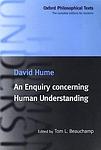David Hume
David Hume was an 18th-century Scottish philosopher, historian, economist, and essayist known especially for his philosophical empiricism and skepticism. He is regarded as one of the most important figures in the history of Western philosophy and the Scottish Enlightenment. Hume's major works include 'A Treatise of Human Nature' (1739–40), 'Enquiries concerning Human Understanding' (1748), and 'Enquiries concerning the Principles of Morals' (1751). He was also known for his essays on various topics and his history of England. His work has had a profound influence on philosophy, particularly on the philosophy of religion, ethics, and economics.
Books
This list of books are ONLY the books that have been ranked on the lists that are aggregated on this site. This is not a comprehensive list of all books by this author.
-
1. An Enquiry Concerning Human Understanding
This philosophical work explores the nature of human knowledge, arguing that all of our understanding comes from experience rather than innate ideas. The author challenges the idea of causality, suggesting that our belief in cause and effect is based on habit rather than logical reasoning. The book also discusses the limitations of human understanding, including the inability to fully comprehend the concept of God or the soul, and the impossibility of certain knowledge. The author's skepticism about traditional philosophical concepts has had a significant influence on later philosophers and the field of epistemology.
-
2. A Treatise of Human Nature
This philosophical work delves into the understanding of human nature, focusing on the mind, emotions, and morality. The author argues that all of our thoughts and ideas are derived from our senses and experiences, rejecting the idea of innate ideas. He also debates the nature of causality, the existence of the self, and the basis of moral judgments. The work is a comprehensive exploration of empiricism, skepticism, and naturalism.
-
3. Dialogues Concerning Natural Religion
This philosophical work is a series of discussions between three characters who explore the nature of God's existence through the lens of empirical evidence and reason. The dialogues delve into arguments for and against the existence of a divine creator, touching on the problem of evil, the argument from design, and the limits of human understanding. Through these conversations, the text critically examines the rational basis for religious belief, questioning the traditional arguments for God's existence and highlighting the complexities and contradictions inherent in theological explanations of the universe. The work is a seminal contribution to the philosophy of religion, showcasing the author's skepticism towards religious dogma and his commitment to empirical inquiry.


